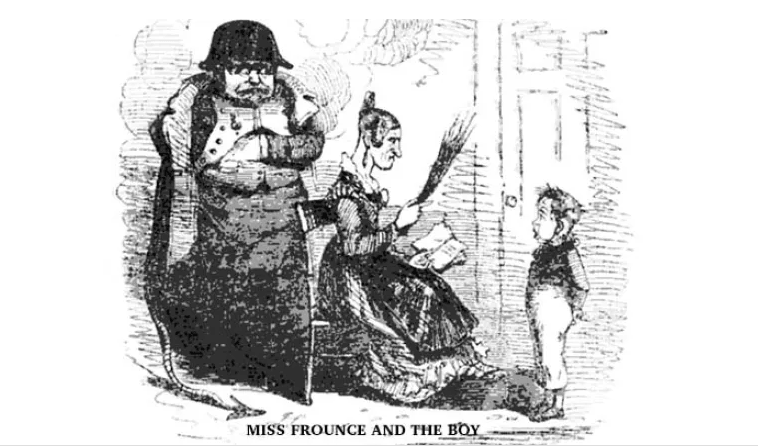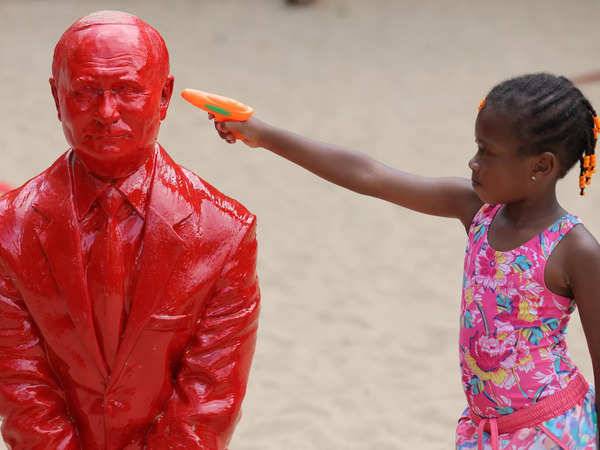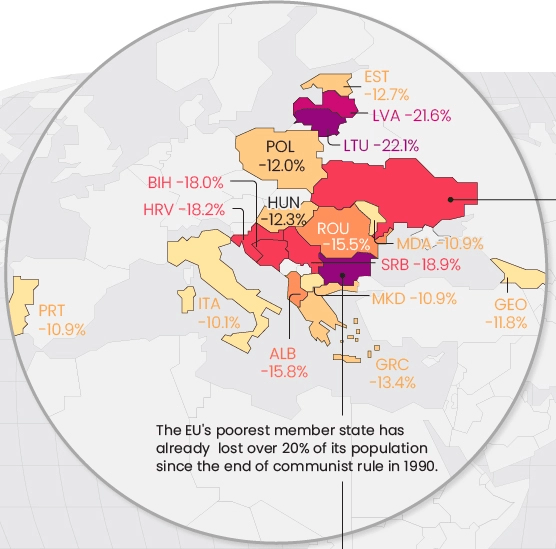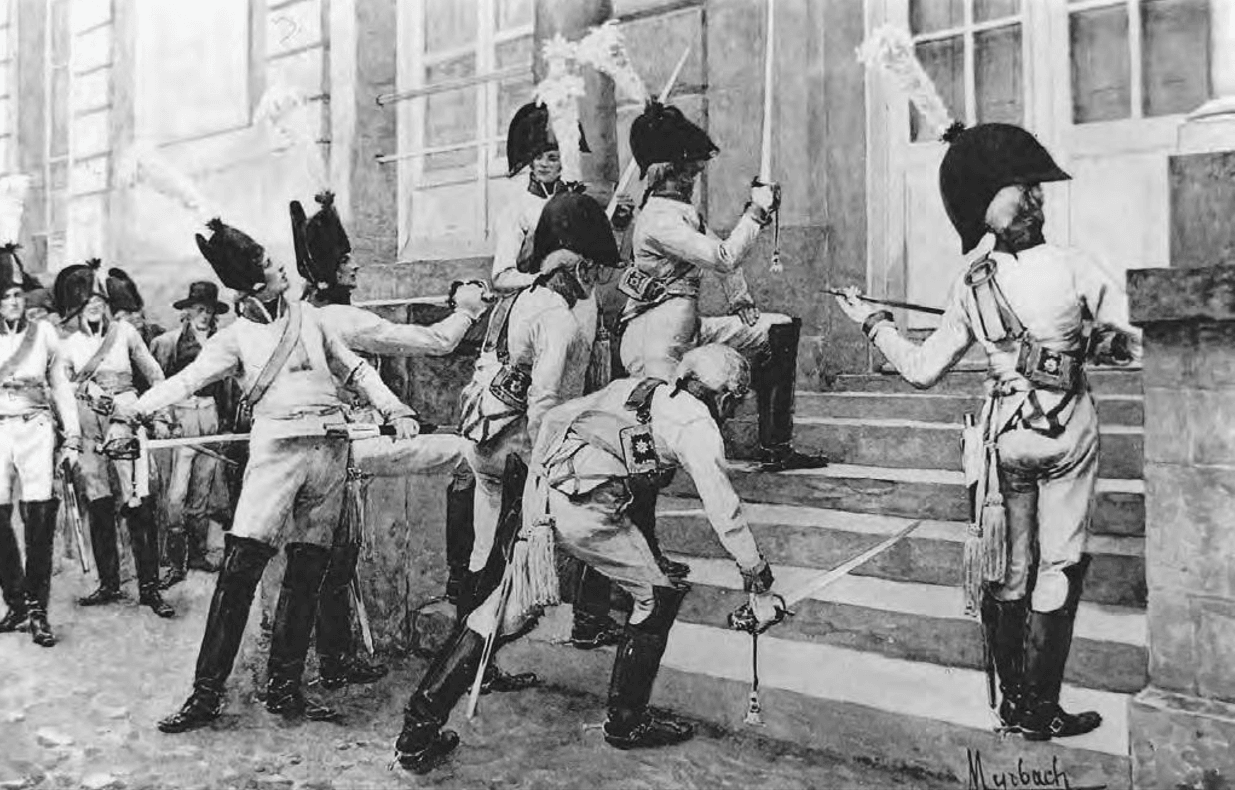Tomorrow, the “free world’s” price cap on Russian oil is set to begin. This reminds me of another historical event. On 9 October, 1806, Prussia declared hostilities against France, and so began the War of the Fourth Coalition. Absolutely confident in their martial abilities, Prussian officers gloatingly sharpened their swords on the steps of the French embassy in Berlin. Napoleon crushed the Prussian army in less than a week. On 27 October, he captured Berlin, and then paraded surviving Prussian officers past the embassy they had mocked. There’s an obvious moral lesson here about not being overconfident, but today I want to talk about why the Prussians up as cannon fodder against Napoleon.
In 1793, Prime Minister William Pitt declared a “war of extermination” between Britain and France, and commenced an intense domestic propaganda campaign. Like with the Germans and Russians in future wars, the British people were brainwashed to hate and fear the French. Propaganda depicted “Boney” Napoleon as a literal ogre who would eat disobedient British children and this imagery was quite effective at making youngsters legitimately terrified of him. It’s not unlike how modern British and American children are brainwashed to hate and fear Putin. Such propaganda efforts aren’t silly and pointless, far from it. A school child indoctrinated with intense anti-French propaganda from early childhood in 1793 could be a soldier or a sailor (or the wife of one) in the following decade.


Over the next 20 years, the British Empire waged war against France. But despite the absolute hysteria of their propaganda, very little of this was direct conflict. The British were never believers in fighting your own battles. No, it’s much better and smarter to get other people to fight your battles, and that’s exactly what they did. British diplomats toured Europe visiting the courts of anyone who might be gullible enough to be goaded into war with France. Any and all enemies of France were eligible for financial support, as long as they could hurt her in some tangible way.
Though these coalitions failed one after the other, they did take a cumulative effect against Napoleon over time, especially when combined with Britain’s naval superiority. In 1805, Admiral Nelson decisively smashed the Napoleon’s fleet at the Battle of Trafalgar, enabling the British to blockade French ports. In response, Napoleon implemented the Continental System in an attempt to embargo European exports to Britain. Napoleon’s idea might have worked and saved him from ruin, but the crucial problem with the Continental System is that it dragged him into conflict with anyone who refused to cooperate, leading to wars with the Fourth and Fifth Coalitions, which he defeated. And then the War of the Sixth Coalition in 1812, which compelled Napoleon to make the biggest mistake of his life, invade Russia.
And that is why proxy wars are so effective. Napoleon smashed every army sent against him, but he really didn’t gain anything from these experiences and the British lost nothing. It was just other people killed and other countries destroyed. Still, the pattern of the British manipulating other people to fight for them didn’t go unnoticed:
In Europe was born saying:
“England will fight against Napoleon
to the last drop of Prussian, Austrian
and Russian blood”.
Let’s look at a more modern example, Afghanistan.
First, the fatalities (both combat and noncombat) of the Soviet forces and their Afghan allies in 1979-89:
Soviets: 14,453
Afghan Forces: 18,000
Now, the US war in Afghanistan 2001-2021 (also combat and noncombat):
American service members: 2,406
Non-American Coalition: 1,151
Civilian Contractors: 1,822
Afghan Forces: 67,558–70,558
Clearly, the Anglo and Russian philosophies toward war are very different.
Like the war with Napoleon, the Anglos’ current war with Russia is a hybrid conflict. That’s why the start of the European “price cap” on Russian oil tomorrow is going to be very interesting. Incidentally, Hungary is exempt from it.
And lastly, I am skeptical that the proxy war in Ukraine is going to end soon. Quite the opposite, I think it’ll broaden to consume other countries. When NATO has finished “fighting to the last Ukrainian,” they’ll commence “fighting to the last Pole” and “fighting to the last Latvian” and so on until they’ve completely run out of Europeans. Here’s why I think that. All of Europe is suffering population decline, especially the former Soviet and Warsaw Pact countries that have been democratized. Ukraine was headed toward demographic armageddon even before the first Russian soldier arrived, and this decline is actually much worse in the Baltic states.

These states only exist to weaken Russia, and their ability to do that is dependent on how many soldiers they can put in front of Russian guns. Within the next 20 years, these populations will be so small and elderly they’ll literally be unable to fight any kind of war. If the war in Ukraine is allowed to end without achieving its goal of Balkanizing Russia, there might not be another chance.
UPDATE: A previous version of this post had an incorrect figure for coalition fatalities in Afghanistan. I fixed it.
Ian Kummer

All text in Reading Junkie posts are free to share or republish without permission, and I highly encourage my fellow bloggers to do so. Please be courteous and link back to the original.
I now have a new YouTube channel that I will use to upload videos from my travels around Russia. Expect new content there soon. Please give me a follow here.
Also feel free to connect with me on Quora (I sometimes share unique articles there).




Polandistan is already being used to fight Russia to the last Pole. I doubt the Baltic slagheapstans could fight Russia today evwn if they armed every able bodied Balt and put together an army.
The Baltic midgets probably have their days numbered as independent entities.